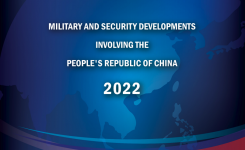- Partnership for Peace Consortium of Defense Aca...
- PfPC Products
- Managing Strategic Changes Through DEEP Reforms...
Managing Strategic Changes Through DEEP Reforms: A View from the Perspective of U.S.–Armenia “Smart Power” Cooperation
0 comments
By Hayk Kotanjian
Education is a systematic process of forming the fundamental ability to think analytically, incorporating both basic and specialized knowledge. Therefore, in the armed forces of leading countries of the world, the field of military education and personnel management is regarded as a primary factor for ensuring the efficiency of the defense security system and the combat capability of the military.
Defense education reforms are a significant part of the overall reforms being implemented in the defense security sector in Armenia that are helping bring both more credibility and accountability into the Armenian Armed Forces and the National Security System on the whole. The importance of defense education has grown significantly within recent years due to the introduction of sophisticated new armament systems. Current military standards demand a new level of requirements for both soldiers and officers, and military professional education is one of the most important tools to help prepare highly qualified personnel who will be capable of implementing different tasks in the rapidly changing atmosphere of the modern battlefield.
The cause and the essence of these innovations are not only due to hard power subsystem dynamics, but also require accepting the fundamentally new orientation in thinking about security that is not exclusively based on threat assessments and a presumed hard power response, as was the case in the past. Over the past decade, after the Prague NATO Summit, Armenia has employed comparative analysis and innovative decision making to smoothly turn its defense security thinking toward a goal-oriented approach that synthesizes both soft and hard security dimensions within one holistic “smart power”-oriented defense security policymaking system. The other important dimension of these improvements is a gradual transition from an obsolete “apparatchik” mode of Stalinist-style military governance of the Ministry of Defense to a modern leadership and management culture characterized by the redistribution of powers between defensepolicy institutions and military bodies and the delegation of power and duties to lower tiers in the hierarchy.
In the United States, the system of professional military education (PME) must meet certain basic requirements, namely that it should be comprehensive, systemic, consistent, realistic, effective, and unanimous in concept, terms, goals, challenges, and opportunities. The U.S. system is familiar to me, due to my five and a half years of Defense, Army, Air Force, and Navy Attaché service as well as having held academic fellowships at the Defense Language Institute in San Antonio, Harvard University’s National Security Program, the National Defense University,
RAND, and the Marshall Center for Security Studies. PME training places constant tension on the mind, will, and body, giving great attention to physical fitness and its major role in service activity of all categories of personnel.

